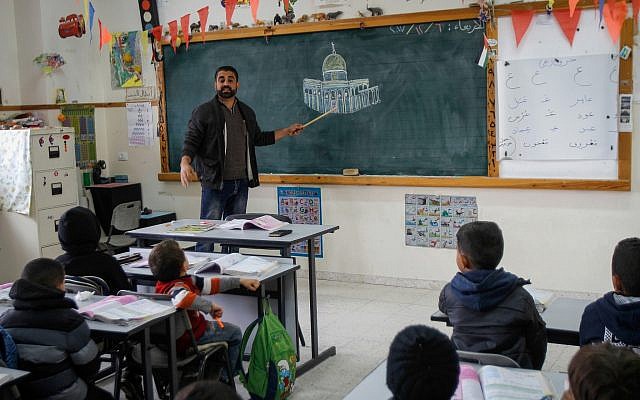LONDON — A post-Brexit row, described as “a comedy of errors,” has broken out between the European Union and Britain over a review of Palestinian school textbooks that was commissioned before Britain left the EU on January 31, 2020.
Israel-based education watchdog IMPACT-se states that preliminary reviews of the textbooks, carried out by the German Georg Eckert Institute, contained numerous errors. First among them: IMPACT-se claims that the institute was actually looking at the wrong textbooks.
According to IMPACT-se, the institute examined books used in Israel’s Jerusalem municipality Arab schools, and not those used in the Palestinian territories.
The Israel-based nonprofit organization IMPACT-se, or the Institute for Monitoring Peace and Cultural Tolerance in School Education, analyzes Mideast and global school textbooks, teachers’ guides, and curricula and submits regular reports on the level of prejudice and intolerance found within.
After IMPACT-se analyzed the preliminary German research, which it obtained through a Freedom of Information request, the nonprofit concluded it was “plagued by poor comprehension of Arabic, missing terminology and factual inaccuracies.”
Asked by The Times of Israel about the alleged errors in the forthcoming report, the German Georg Eckert Institute had no comment on IMPACT-se’s claims and issued a statement that “the study of approximately 150 textbooks, published by the Ministry of Education under the Palestinian Authority since 2017, will be finished and made available in October 2020, according to the agreement between the EU and the Georg Eckert Institute.”
On May 11, 2020, UK’s Minister for the Middle East James Cleverly told Parliament that June 2020 was the final completion date for the interim report, with the full report set to be completed “later in the year.” According to a spokesperson from the UK’s Department for International Development (DfID), the final report is due to be published at the end of 2020.
DfID declined to divulge how much the UK contributed towards the first “inception” report. The European Union paid €217,833 for the second “interim” report.

A snapshot from the EU’s Interim report presentation illustrating an example from an Israeli textbook, which it presents as a PA textbook which ‘promotes tolerance towards Israeli individuals.’ (Courtesy IMPACT-se)
Britain, via DfID, has, however, funded a variety of Palestinian civil service projects, including paying the salaries of Palestinian teachers — the most expensive item in the PA Education Ministry budget.
Last year, DfID gave GBP 20 million ($26.2 million) to fund Palestinian teachers’ salaries and an additional GBP 65.5 million ($86 million) to the UN Relief and Works Agency, which supports the education of 500,000 Palestinian refugees across the Middle East, including over 320,000 children in the West Bank and Gaza Strip using the official Palestinian Authority curriculum.
Britain maintains that it doesn’t fund the writing of texts and only pays salaries of “vetted teachers” — that is, those who are not official Hamas members — who work in Palestinian schools. But IMPACT-se says it is teachers who write and use the textbooks.
Overlooking anti-Semitism
Lobby groups in Britain, including the parliamentary Labour and Conservative Friends of Israel, have repeatedly asked the British government to investigate what was being taught in Palestinian schools across the curriculum.
To date there have been two reports carried out by the same teams at the Georg Eckert Institute: an “inception” report, paid for by the UK, and an “interim” report, which has been paid for by the EU.

Illustrative: An image said to be from a Palestinian school textbook covering physics which shows a Palestinian boy shooting a slingshot at Israeli soldiers. The caption, according to the Daily Mail, reads: ‘What is the relationship between the elongation of the slingshot’s rubber and the tensile strength affecting it? What are the forces that influence the stone after its release from the slingshot?’ (Courtesy IMPACT-se)
An initial 177-page summary of the interim report — since removed from the Georg Eckert website — shows identical research to the first inception report, as well as identical staffers, headed by Aurelia Streit.
Streit is a former intern at the House of Commons for the Labour MP Afzal Khan, a member of Labour Friends of Palestine.
According to three Conservative British parliamentarians who have voiced their concern to Foreign Secretary Dominic Raab, an IMPACT-se breakdown of the material in the as-yet unpublished interim report says there are “troubling examples of incitement to violence and antisemitism [which] appear to have inexplicably been entirely overlooked.”
Raab will be the senior cabinet minister responsible for handling the claims because the Foreign Office and DfID are set to merge shortly.
House of Lords members Eric Pickles and Stuart Polak, together with MP Stephen Crabb — say that information about the Georg Eckert research “raises fundamental questions about the whole inquiry,” which “seems likely to fall far short of the standard the UK government and Parliament can reasonably have expected.”

Eric Pickles speaks at a Conservative Friends of Israel event. (Conservative Friends of Israel)
“Members in both Houses of Parliament have expressed concerns about the content of teaching material supplied by the Palestinian Authority for use in schools. [There is] a curriculum that glorifies violence and encourages discord,” they told Raab.
Noting that books surveyed by the German institute appear to be the textbooks used in Jerusalem municipality Arab schools, rather than those used in Palestinian schools, Pickles, Polak and Crabb have expressed concern about the institute’s methodology and research, and ask for publication of the interim report as soon as possible.
Early warning of inflammatory material
In March this year, Marcus Sheff, CEO of IMPACT-se, made a presentation in the British parliament about the content of actual Palestinian textbooks, drawing attention to inciting material such as a reading comprehension exercise featuring a story which describes a Molotov cocktail on a bus full of Jewish civilian passengers, using the expression “barbecue party.”

Marcus Sheff, left, CEO of IMPACT-se, and Arik Agassi, right, COO of IMPACT-se. (Courtesy)
A story for an Arabic language lesson describes suicide bombings in which Palestinians “wore explosive belts, thus turning their bodies into fire burning the Zionist tank.” Another textbook talks about Jews controlling global finance, media and politics for their own benefit.
This inflammatory material was missing from what was excerpted from the George Eckert Institute review. The institute’s findings say that Palestinian Authority editors have “a serious involvement… with conflict-related connections… and careful consideration and differentiation towards Israeli individuals.”
However, the institute had been looking at the Jerusalem municipal textbooks, not those of the PA, claims IMPACT-se.

Illustrative: An image of a girl smiling as ‘heretics’ are burned in a Palestinian textbook. (IMPACT-se)
“The UK rightly led calls for an international review into the concerning content of Palestinian textbooks,” MP Crabb told The Times of Israel. “Government ministers have demonstrated a clear preference for transparency by encouraging the EU to publish the overdue interim report ahead of the new academic year. We urge ministers to get to the bottom of reports of basic translation errors and the presentation of Israeli textbooks as Palestinian Authority textbooks.”
“As DfID merges with the Foreign Office, a cohesive new strategy for UK support to the Palestinian people, taking these concerns into account, is crucial,” Crabb said.
The Conservative politicians, asking the Foreign Secretary for assurances that the UK government intends to publish the report, insist that “British taxpayers have the right to know what it is actually being taught” in Palestinian curriculums they partially fund.
The left-leaning Labour Friends of Israel (LFI) has expressed similar concern, writing to Middle East Minister Cleverly to ask for clarification.

Illustrative: A Palestinian class at the Salem School, East Jerusalem, December 6, 2017. (Nasser Ishtayeh/Flash90)
LFI vice-chairman MP John Spellar told Cleverly: “Specific examples which are singled out for praise by the researchers are not contained in PA textbooks, but those used by pupils in the Jerusalem municipality’s Arabic-language schools. If this is not an error, I’d be grateful for an explanation as to what interest the British government and EU have in studying textbooks which are funded by Israeli taxpayers and which are not used in PA schools?”
I’d be grateful for an explanation as to what interest the British government and EU have in studying textbooks which are funded by Israeli taxpayers and which are not used in PA schools?
“If accurate, IMPACT-se’s allegations seriously undermine the credibility of the textbook review and call into question its utility as a means to deal with the issue of incitement to violence in the PA curriculum,” Spellar added.
‘Zero tolerance’ for violence
A DfID spokesperson told The Times of Israel that the UK government has a “zero tolerance” approach towards incitement to violence. DfID “lobbied our European partners to conduct a thorough independent review of textbooks used in the Occupied Palestinian Territories, which is now underway.”
“This review is ongoing, and the final report is not due to be released until the end of 2020. We will study its findings carefully,” they said.

Illustrative: Alistair Burt, British Minister of State for the Middle East and North Africa, visits the Khan al-Ahmar Bedouin village in the West Bank, May 30, 2018. (Menahem Kahana/AFP)
Britain, the DfID said, did not comment on leaked reports of inaccuracies, a position echoed by the former minister who commissioned the UK research, Alistair Burt, who retired from parliament in 2019.
“As minister, I supported the inquiry into Palestinian textbooks, as allusions to violence, for whatever purpose, have no place in children’s textbooks, not least in the fraught context of the unresolved issues between the Palestinian people and Israel,” Burt told The Times of Israel. “All children deserve a life free of the atmosphere of terror and oppression which still pertains there, and look to their respective leaderships to deliver this.”
Allusions to violence, for whatever purpose, have no place in children’s textbooks
“The inquiry has not yet completed its work, but I would expect it to fulfill its full remit, and I believe that should remain the view of the UK government,” he added.

Illustrative: Palestinian children use laptops at the Ziad Abu Ein School in the West Bank city of Ramallah, September 8, 2018 (AP Photo/Majdi Mohammed)
IMPACT-se’s Sheff calls the whole chain of events “really regrettable.”
“The European Union and the UK had the opportunity to add to our collective understanding of these extreme textbooks and to fulfill their duty of care to Palestinian students,” Sheff said.
“Instead, the review has been a comedy of errors from start to finish. The researchers have reviewed the wrong textbooks, taking textbooks for Israel’s Arab schools in Jerusalem, earnestly praising them and presenting them as coming from the Palestinian Authority’s curriculum.
“The researchers’ introduction contains embarrassing mistranslations of basic Arabic, a lack of familiarity with Palestinian culture and, bizarrely, the citing of non-existent research. This is not a particularly complex project. It is hard to fathom how it went so wrong.
Adding insult to injury, he said, the report has been “plagued” by delay.
“The British government clearly wants it made public as soon as possible, but the EU has declared it is staying under wraps. Frankly, given the debacle this research project has become, one can understand why,” Sheff said.
Related posts:
Views: 0
 RSS Feed
RSS Feed

















 August 21st, 2020
August 21st, 2020  Awake Goy
Awake Goy  Posted in
Posted in  Tags:
Tags: 
















